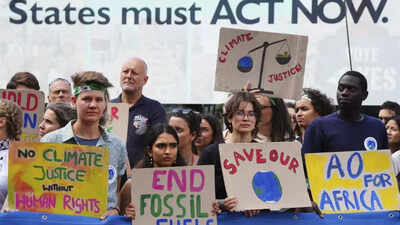ARTICLE AD BOX

Activists protest outside top UN court ahead of climate change advisory ruling. (AP photo)
United Nations's top court has said that inaction on climate change could be unlawful. The international court of justice (ICJ) said on Wednesday that countries may be breaching international law if they fail to take meaningful steps to protect the climate.
It also opened the door for reparations to countries already affected by the crisis. Court president Yuji Iwasawa called the climate emergency “an existential problem of planetary proportions” and warned that ignoring it could amount to a “wrongful act” under international law. Activists celebrated outside the court. The case was led by the Pacific island nation of Vanuatu and supported by more than 130 countries. After years of pressure from vulnerable island states, the UN general assembly had asked the ICJ in 2023 to give its opinion. A panel of 15 judges answered two key questions: what are states legally required to do to protect the environment, and what happens if they don’t? The court’s opinion, over 500 pages long, said that every person has a right to a clean, healthy, and sustainable environment.
It's a human right. The statement alone could be used in domestic and international courts. Experts say this could shape future lawsuits, investment treaties, and even climate policies.Vanuatu’s attorney general reminded judges that his people’s survival was at stake. Sea levels in parts of the Pacific were rising faster than the global average. Global temperatures have already increased by 1.3°C since pre-industrial times.
UN's top court says failing to tackle climate change 'could violate international law'
Some countries, like the US and Russia, have opposed any court-mandated emission cuts. But ICJ’s opinion adds to growing legal pressure. Earlier this month, the Inter-American court of human rights ruled that countries must avoid environmental harm and restore damaged ecosystems. Last year, the European court of human rights made a similar call. In 2019, the Dutch supreme court became the first to link climate change and human rights, ruling the government must protect citizens from its effects. Though the ICJ ruling is not legally binding, it marks a significant shift in climate law. The court itself admitted that law alone cannot solve the crisis, but said it plays an “important” role in shaping global responsibility.



.png)
.png)
.png)
















 8 hours ago
5
8 hours ago
5







 English (US) ·
English (US) ·